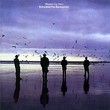|
|

Speakers' corner Following up our retro scope series of 2006 and 2007, 2009 and 2010 - here's the ever-continuing, never-stopping New Speakers' corner! Luna Kafé's focused eye on great events, fantastic happenings, absolute milestones, or other curious incidents from the historic shelves/vaults of rock. This moonth JP's dust-brushed a 30 year old platter, from the times when the fashion mode was: black hair (troll style), pale faces (make-up), dark clothes (black), and the music was rather gloomy and depressive (depp rock, in Norwegian). 'Just when the thought occurs the panic will pass / and the smell of the fields never lasts / place our faith In those crimson nights / set sail in those turquoise days...'. Please welcome, Mac and the boys: 'All my colours turn to clouds... zimbo zimbo zimbo zimbo zimbo zimbo zimbo...'
Echo & The Bunnymen Being in the army for one mandatory year was a mixed experience. I met quite a few nice people, mainly common soldiers, and some bastards, mainly lower officers. We learned how to destroy and kill. At a winter exercise, the army chaplain was the most eager to check how many bullets had gone through some cardboard soldiers in a few tents that we had shot at during a so called surprise attack at the enemy camp (sic!). After demobilisation I had a confrontation with myself and decided never to wear any green uniform again and to become a pacifist, atheist and probably a couple more -ists, too. It had mainly been hell down there, but with some nice experiences in between. One of them was being introduced to music by The Associates, The Cure and Echo & The Bunnymen by an enthusiastic fellow sufferer. I was fond of the music of Teardrop Explodes (Julian Cope & co.) at the time, but hadn't heard anything by twin Liverpudlian band Echo until one dark evening at the fortress in northern Norway. Bunnymen's debut album Crocodiles (1980) was filled with punk-energetic pop-rock caps. Short, sweet - in a way - and effective. A great debut! Heaven Up Here was of another calibre. The quartet had developed, kept the best parts of the energetic outbursts from the debut, but their main asset by now was to be more restrained, experimental and slow down. In addition the voice of singer and front man Ian MacCulloch occasionally grew a bit in direction of being pompous, not least in the opening track "Show Of Strength". Luckily the instrumental arrangements are not of the same ilk. But if Mac had had a good catholic upbringing and this development had continued, his band might have beaten their contemporaries such as Simple Minds and U2 at their home ground. It didn't occur, of course. The first thing on my mind, listening to the 30 year old album today, is the lack of ordinary songs. The first single off and only next to happy song of the album "A Promise", seem to be one of the few to keep to the ordinary verse- verse-chorus-verse-solo-chorus-chorus-or-something-formula that some other Liverpool bands practiced around 15-18 years earlier. The other tracks are more experimental both concerning form, contents and arrangements. Especially "The Disease" stands out in this respect with a slowly building windy synthesizer at the start that leads to a couple of verses with simple guitar backing. Then it grows very harmonious with some calm woodwind instrument (it sounds like a flute) by guest musician Leslie Penny before a more disturbed effected, almost backwards, voice and melody finishes the thing off after only a little more than two minutes. The guitar playing by lead guitarist Will Sergeant and rhythm guitarist Mac is outstanding throughout. There are seldom any big sounding chords involved. Here are more single string notes and chords played on less than six strings. Also, there are not so many catchy melodies involved with "All My Colours" being a noteworthy exception with a memorable drum pattern and sad woodwind. The album as a whole has more to do with creationg moods. I guess at least half the songs here might have fallen flat to earth if it hadn't been for the excellent production by a young Hugh Jones, who had been engineer of Crocodiles, in association with the band. Wikipedia says that Hugh made a name early in the 1980s with a jangly sound that aged better than many of his contemporaries' production styles. That's really true! The airy production gives space for guitars in many shades and colours, an echoed drum beat and voice here & there. It sounds inspired by Steve Lillywhite's ditto for U2's debut the previous autumn. Which really can't be bad (their only digestible, album if you ask me). And it might be a main reason why Heaven Up Here was so successful when it was released. It made it to the Top 10 in Britain and even to the lower steps of Billboard 200 in the US. Most rock music is about releasing energy, pointing outwards, weather it is in the form of explosions or somewhat calmer energy. You know, the original rock'n'roll, early days Springsteen, punk and heavy metal, the lot. Some exquisite music on the other hand, points inwards, acts like an implosion and end as a hard oppressive ball in your stomach. The best of Nick Drake and Joy Division work that way (well, I suppose it doesn't have to be suicidal), also the best of Wire, and Echo & The Bunnymen vintage 1981. This includes half of "Over The Wall" (the second single off the album b.t.w.) and particularly "Turquoise Days". The claustrophobic effect on the voice of "It Was A Pleasure" and last part of "The Disease" and the hectic-chaotic rhythm and vocals of the title track reverberate some of the same feelings. Listening to those tracks today brings back the tension three decades ago. They are good reminders that the album title can still be true: This is the one for the trees This is the one called heaven And this is the one for me!' Copyright © 2011 JP
|
| © 2011 Luna Kafé |
